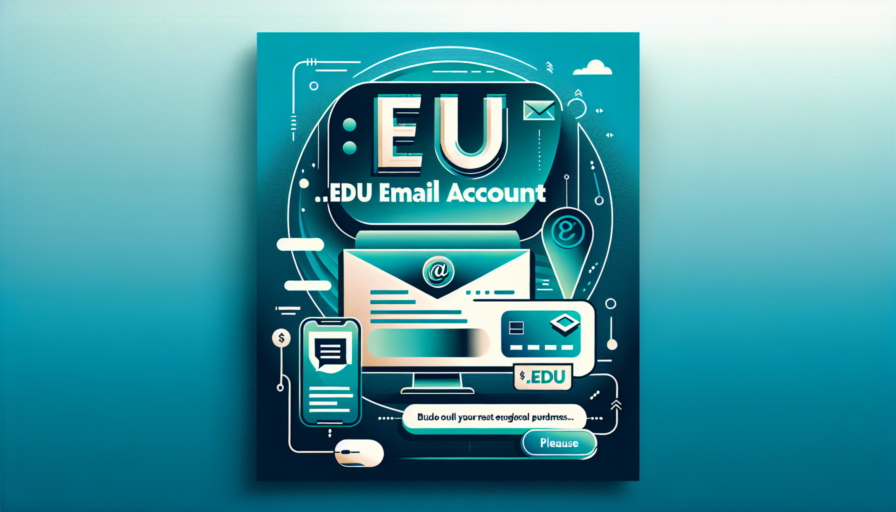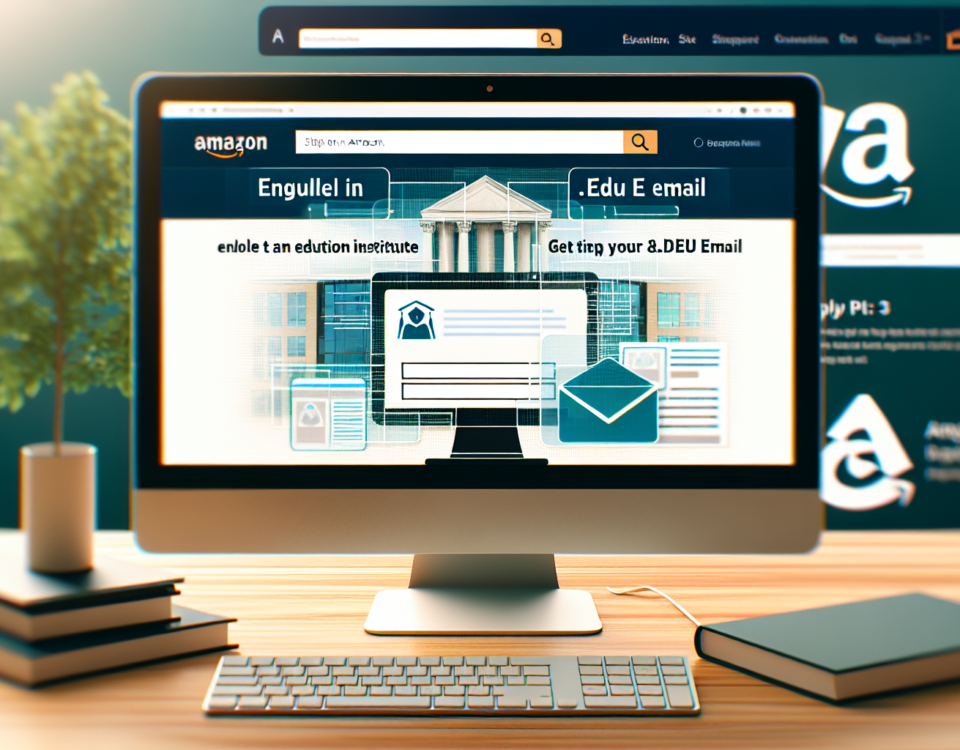
Ultimate Guide to EDU Email Sign Up: Unlock Student Benefits & Discounts!
February 15, 2024
How to Create an EDU Email Account: Complete Step-by-Step Guide
February 15, 2024What Is an .Edu Email Address and Who Qualifies for It?
An .edu email address is a domain typically used by educational institutions, such as universities and colleges, to distinguish their email systems from those used by businesses (.com), organizations (.org), or government agencies (.gov). The “.edu” domain is a sponsored top-level domain (sTLD) in the Domain Name System of the internet. It is reserved specifically for educational institutions that meet certain eligibility requirements, and its use is intended to convey a level of trust and authority in the realm of education.
The entities that qualify for an .edu email address are primarily post-secondary institutions that are accredited by an agency on the U.S. Department of Education’s list of nationally recognized accrediting agencies. This accreditation ensures that the institutions uphold certain educational standards essential for their degrees and credits to be recognized by other institutions and potential employers. Some primary and secondary schools, educational programs, and educational consortia also qualify for a .edu domain, but their inclusion is based on historical exceptions rather than current policy.
Historically, the .edu domain was more loosely regulated, but since 2001, the eligibility is much stricter. Now, to obtain and maintain an .edu email address, an institution must regularly re-verify their accredited status. Individuals such as students, faculty, and staff at qualifying institutions are the typical end-users of these .edu email addresses. The benefit for these individuals is not only a professional-looking email address but also potential access to various educational discounts, digital services, and resources exclusive to the academic community.
It’s worth noting that not all educational entities abroad have access to the .edu domain, as many countries have their own specific domains for educational institutions. For instance, .ac.uk is commonly used by universities and further education colleges in the United Kingdom, while .edu.au is used in Australia. As such, the .edu domain is generally a hallmark of American educational institutions that have met the specific criteria to be part of this exclusive digital space.
Exclusive Benefits of Having an .Edu Email Account
When it comes to email accounts, an .edu address is more than just a means for academic communication. It provides a gateway to a wide array of exclusive benefits that are not available to the general public. From hefty discounts on software to accessing scholarly articles, the perks associated with an .edu email account can significantly enhance both the educational and personal experiences of students and educators.
Free or Discounted Software and Subscriptions
One of the most significant advantages of an .edu email account is the access it grants to a plethora of software and subscription-based services at reduced or no cost. Major companies such as Adobe and Microsoft offer substantial discounts on their products for users with a valid .edu address. This not only includes essential productivity tools like Microsoft Office Suite but also creative software like Adobe Creative Cloud. Moreover, students can benefit from extended trial periods and special pricing for streaming services, such as Spotify and Amazon Prime, enriching their leisure time and study breaks with endless entertainment options.
Access to Scholarly Research and Academic Resources
A lesser-known yet valuable benefit of having an .edu email account is the access it provides to academic databases and scholarly journals. Academic institutions often have partnerships with libraries and research resources, allowing their students and faculty to delve into comprehensive databases such as JSTOR, LexisNexis, and IEEE Xplore for research or personal growth. This access to a wealth of knowledge can be invaluable for completing coursework, staying current with the latest academic findings, or expanding one’s intellectual horizons.
Networking and Professional Opportunities
The credibility associated with an .edu email address can also open up networking and professional growth opportunities. An institutional email account is typically recognized as a trusted source, increasing the likelihood of communications with professionals and experts being received and acknowledged. Additionally, users can often access exclusive job portals, career fairs, and internship programs available solely through their academic institution, fostering connections that might not be available to the public at large.
Step-by-Step Guide to Acquire Your .Edu Email Address
Sure, here is some sample SEO content for the specified H2:
Understanding the Benefits of a .Edu Email Address
Before diving into the process, let’s acknowledge why a .edu email address is a valuable asset. Traditionally, .edu addresses are exclusively for educational institutions and their students in the United States. Holding such an email account often grants access to a range of educational resources, software discounts, and powerful networking opportunities, which can be a significant boon for students and educators alike.
Eligibility for an .Edu Email Account
To begin your journey towards acquiring a .edu email address, you must first establish your eligibility. Typically, you are eligible if you are a student, faculty member, or staff at an accredited educational institution. Some institutions may also provide .edu email addresses to alumni. You’ll need to check with your specific institution’s guidelines to understand their policies and the types of documentation required for verification.
Registration Process
- Visit Your Institution’s IT page: Start by navigating to your university’s Information Technology or equivalent webpage, where they will likely have a section dedicated to email services.
- Create or Access Your University Account: You will need to create a new university account or log in with your existing credentials. This often involves entering personal information, such as your student ID number, to verify your association with the institution.
- Enroll for an Email Address: Follow the prompts to enroll in an email service. It may involve choosing an email address prefix (the part before the ‘@’ symbol) and setting a password.
- Complete Verification: You may be asked to verify your identity through a mobile number or another email address. Ensure this information is correct as it can be essential for account recovery in the future.
Once you have completed these steps and followed the instructions provided by your institution, you should receive a confirmation that your .edu email address is ready to use. Remember, the exact process may vary slightly depending on your institution’s procedures.
Protecting Your .Edu Email Account: Best Practices for Security
Having a .edu email account marks you as a member of an educational institution, making it a prime target for cybercriminals who are keen on accessing scholarly resources or personal data. It’s pivotal to ensure the security of these accounts, as they often harbor a wealth of sensitive information with access to university databases and services. Adhering to best practices when managing your .edu email can significantly mitigate the risk of unauthorized access and consequent data breaches.
Multi-Factor Authentication (MFA)
In today’s digital age, simply protecting your account with a password is not sufficient. Multi-factor authentication adds an additional layer of security, often requiring you to verify your identity using a second device or a biometric factor. Most educational institutions support MFA, and it is advisable to enable this feature to dramatically decrease the likelihood of account compromise even if your password were to be stolen.
Regular Password Changes and Strength
Creating a strong, unique password for your .edu email account is paramount. Avoid easily guessable passwords such as ‘password123’ or ‘name+birth year’. Instead, opt for complex passwords that include a mixture of uppercase and lowercase letters, numbers, and symbols. Furthermore, changing your password regularly can prevent long-term unauthorized access, thus it’s recommended to update your login credentials periodically and to never reuse your .edu password on other sites.
Phishing Scams and Suspicious Emails
Beware of phishing scams that specifically target educational accounts. Cybercriminals often send emails posing as legitimate institutions or services in an attempt to trick you into revealing your .edu credentials. Be cautious with any unsolicited communication that asks for sensitive information or prompts you to click on a potentially malicious link. Always verify the sender and contact your institution directly if you are uncertain about the legitimacy of an email. Education on these tactics is crucial for maintaining the integrity of your academic email account.
Future of .Edu Email Addresses: Trends and Changes to Watch
The landscape of higher education is constantly evolving, and with it, the role and utility of .edu email addresses are shifting. As a hallmark of credibility and a gateway to many educational resources, .edu email addresses hold significant value for students and institutions alike. However, changing technology and privacy concerns are influencing the future of these specialized email domains. We’re seeing trends that suggest a move towards more secure, versatile, and personalized communication tools for students and educators alike.
One of the predominant changes is the enhanced security measures being taken to protect student and faculty data. With increased threats online, it’s likely we will see two-factor authentication become the norm, alongside more stringent verification processes for obtaining a .edu email address. This move is not only about protecting personal information but also about preserving the integrity of the educational institutions these email addresses represent. As phishing scams and fraudulent activities continue to target .edu domains, heightened security protocols will be crucial in protecting all associated parties.
Additionally, the integration of new technologies is playing a significant role in shaping the future of .edu email addresses. For instance, the incorporation of cloud services and collaborative platforms into the .edu infrastructure is set to enhance the educational experience. This could lead to more streamlined communication and resource sharing among students and educators. However, it may also necessitate a re-evaluation of how .edu emails are managed and provided, balancing convenience with control and oversight to harness these new technologies effectively.
Another emerging trend is the push for personalization and segmentation within .edu email addresses. Institutions are beginning to acknowledge the diverse needs of their communities, and as such, we might witness the customization of email services to cater to these different groups. Specialized email addresses for alumni, current students, faculty, and even specific departments can facilitate more targeted communication and services. The implication of this shift means there may be a more complex array of .edu email structures that map to the varying roles within an educational ecosystem.







